Have you heard about worldschooling (AKA world schooling)? All the cool parents are doing it, it’s the latest buzz word in alternative education. Is it simply taking your kids on holiday to learn about other countries?
In this post we try to answer that question, what is worldschooling? We did it for 6 years, full-time, it’s a type of education we know well, and it works.
Worldschooling can be a lifestyle and a whole-life commitment. Can worldschooling be something you do on weekends or school holidays? Is there a timetable and a curriculum?.
You can do it all-day, every-day. It is life. Worldschooling is a lifestyle choice, a wonderful one, but one you can try for a short time. Try it and you may never go back to regular school.
What is Worldschooling?
Worldschooling is providing and finding education from the real world. It includes experiences, places and people from all over the globe. The more you can travel, the more destinations and the greater variety of cultures, climates, histories and societies you can explore, the more that education grows.
Worldschooling removes teachers, classrooms, schools and set curriculums, it opens doors, opportunities and possibilities. It gives freedom in education and life.
Worldschooling is born through a love of travel and a love of learning about and from the world. There are many versions of worldschooling, some academic, some less so. There is a thriving global worldschooling community and numbers of worldschooling families grow daily.
Our Worldschooling Story
Back in 2012 we decided that travelling with the kids would be a great lifestyle choice for our family and a phenomenal way for the boys to get a better education. I invented a term, travelschooling.
The boys were already out of school and we were very happy with that choice, but we could see that their environment was limiting their learning. They needed more diversity and to see, touch, do and experience it all.
Not much further down the road, I discovered that somebody had already named what we were doing as worldschooling and that it was actually a fairly commonly used term.
So travelschooling was ditched and I started embracing worldschooling. These days everyone is jumping on the band-wagon and I don’t like the dilution of the original idea.
Worldschoolers do not go to school, sorry, non-negotiable you can’t be a worldschooler only on weekends.
If kids go to school they are main-stream educated, nothing different there at all, how can there be? They will be tied to a timetable and a curriculum with insufficient time to experience their surroundings and follow educational paths of their own choosing.
Some worldschooling families do put their kids in school as they travel. It’s their choice and you see it more often where parents want full language immersion and for the child to become bi-lingual.
That said, every homeschooler is different, every unschooler is different, every child and family is different. there is no one fixed right way to homeschool or worldschool and that is absolutely fine. Education should never be one-size-fits-all and that is the massive elephant in the room with the standard education system.
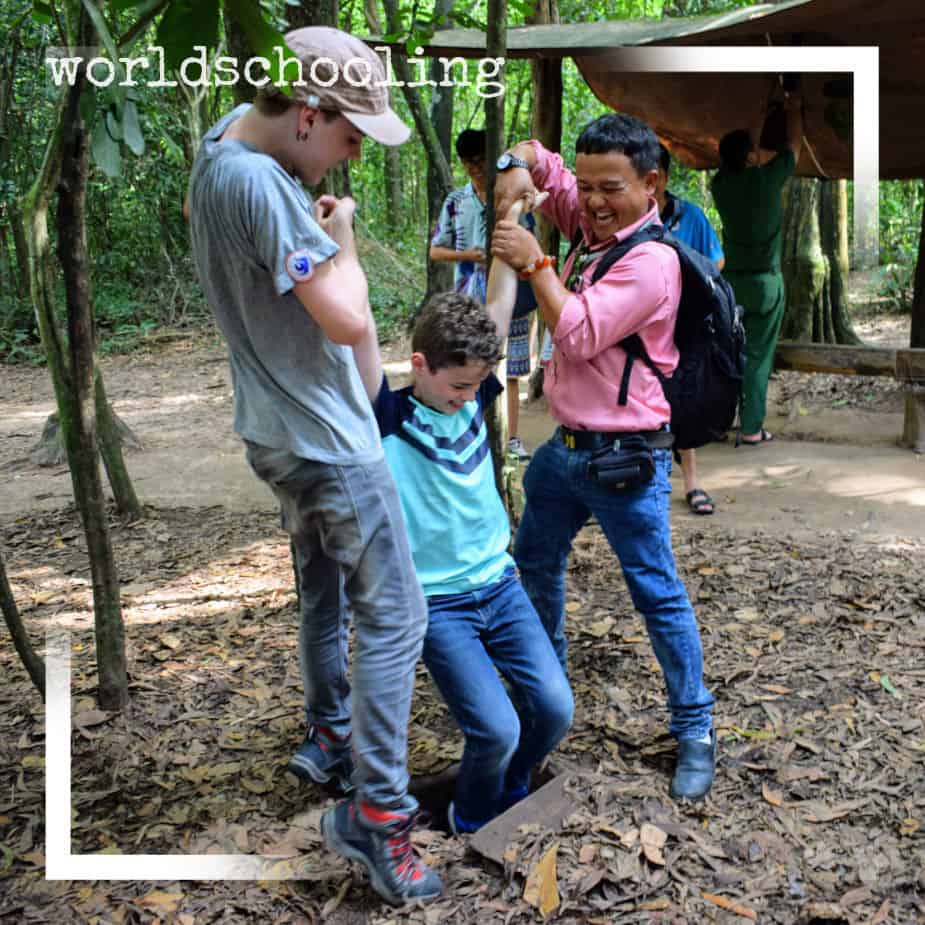
Not everyone is free to take up a digital nomadic family lifestyle but what you can do is try worldschooling. Give it a go, take your kids on a voyage of discovery and freedom on a family gap year. Even 1 year, a taste of worldscholing, could be very good for their world outlook as you strew the world before them. You may find you never want to put them back in school again.
Unschool, Homeschool or Worldschool?
Worldschooling can be unschooling or it can be homeschooling, it really just depends on what you want to call it. We call it homeschooling, others may look at us and call us unschoolers. We’re certainly not unschoolers because we are not fully child-led.
Now, after many years, we do some unschooling, some homeschooling and a whole heap of worldschooling. I think a lot of homeschoolers are that way.
Obviously methods of providing, facilitating and enhancing a child’s education change with need over time, age, environment and interests. Education comes is seasons.
In Australia we tend to use homeschooling as an umbrella term to cover all methodologies, in the UK they prefer to use home education, rejecting the “schooling” term altogether. I usually stick with the term homeschooling, it’s simpler.
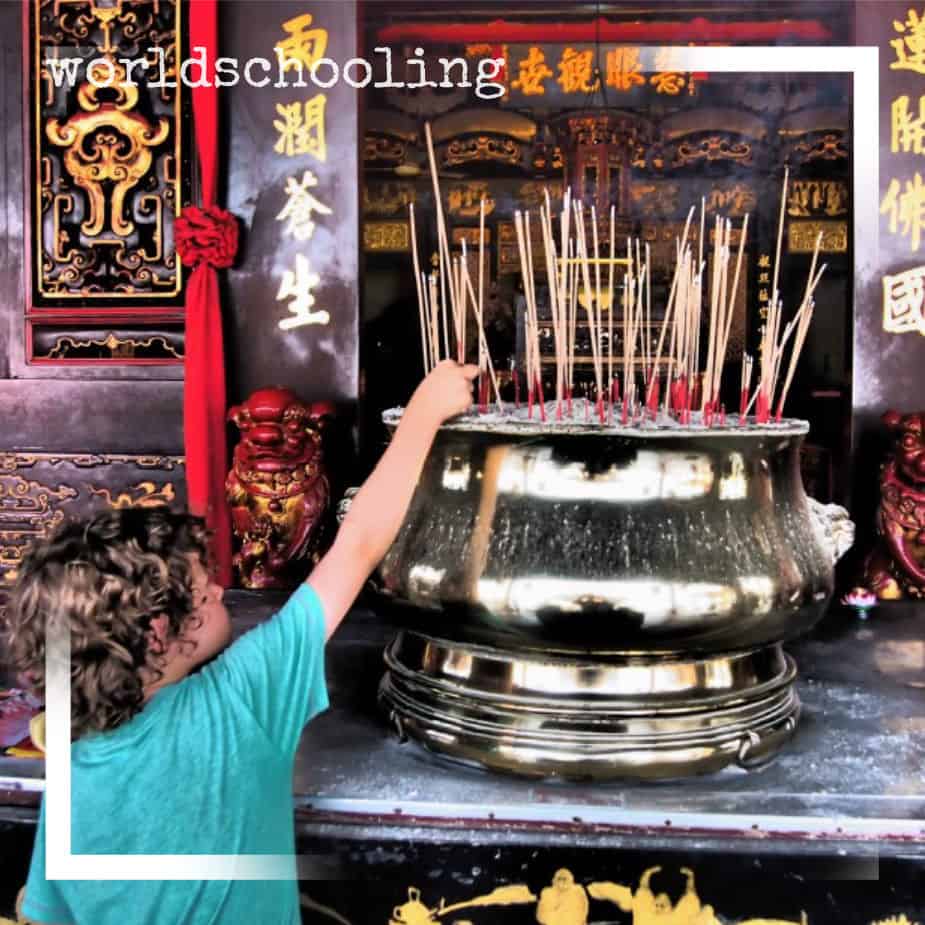
We do our own thing, ignore the school system, and the kids get a great education. But that education has absolutely zero involvement with school. That’s important and a whole-life commitment for however many years family and children choose that path.
We are full-time, full-life homeschoolers or worldschoolers and that education is an active process, one we put a lot of effort into.
If you’re in doubt take a look at our 1 year of homeschooling highlights to see just how much learning happens, naturally, out in the wider world. One teacher commented that our style of learning was what schools try to reproduce in the classroom, and fail
For the uninitiated, here is a brief run-down of the usual terms in the alternative education world:
School-at-Home is doing what they do in school, at home. I don’t personally know anybody who does this. I think this is what homeschooling is taken to mean in the UK and why they prefer to call themselves home educators. These children will probably be fitting back into the school system at some point, maybe taking the usual exams. Many people believe that home educated children are “taught” by a parent. In reality, this rarely happens.
Unschooling is a 1970s term John Holt used, he was never happy with the term, but it stuck. He preferred the term “life”. Unschooling involves a complete rejection of the school system and trust in the children to learn through their own interests and curiosity at whatever pace they prefer. Unschooling is fully child-led learning. Parents and other human beings are involved as key facilitators of that learning. You can see Hannah’s post on “What is Unschooling” here.
Radical Unschooling takes the unschooling philosophy even further to include all aspects of life. Sandra Dodd came up with this term and it totally rejects any distinction between educational and non-educational activities. Radical unschooling removes limits and allows children to make their own choices in all areas of life. I’m no expert if you’d like to know more try Sandra Dodd, or Dayna Martin, prominent radical unschoolers.
Worldschooling is more difficult to define. Some class it as a type of unschooling, some children are world-schooled as they’ve been home-schooled.
When I look back at my first year, 2 years, of being a home educator, it really wasn’t that great. Luckily those first 2 years were before we started travelling and were highly regulated by the government. We found our way through trial and error and were able to hit the road with confidence.
A year on the road probably isn’t long enough to find your educational groove which is one of the reasons I tell parents taking kids on a short trip to just do nothing about “school”. Don’t spoil the experience, just enjoy it and learn naturally.
To me, worldschooling is home education of any sort with a good measure of travel and active learning through travel thrown in.
The partners in the process, the educational facilitator ( parent) and the student have to seek out the learning in the location, it is by no means a passive absorption process.
I don’t want my kids in school. I want them to learn at the source when they are ready or interested. I want them to know that they can teach themselves just about anything because times have moved on and the internet can replace a teacher.
We parents have to facilitate education and totally shoulder the responsibility of our child’s education. It’s a big responsibility that we home-educating parents take on, and we need to be 100% committed to it. It’s not something to mess about with.
Is it Possible to Worldschool and Not Travel?
If you take the simplest definition of worldschooling that I’ve found, then, of course, you don’t need to travel. Worldschooling is learning from the world, we are all in the world, just some of us see more of it than others. That sounds more like a definition of unschooling than worldschooling, I think.
Eli Gerzon claims the term worldschooling as his invention. He says
“It’s when the whole world is your school, instead of school being your whole world.”
His definition seems to take travel out of the worldschooling scenario completely, it certainly removes school.
I guess it could work, but it would be a narrow form of worldschooling to not see the world.
What Does Worldschooling Look Like?
Wherever we worldschoolers are in the world we actively seek out the learning. It involves visiting temples, museums, markets, hotels, railway stations and playgrounds. It involves meeting people from every background, faith, nationality, age and race.
It involves the facilitator, doing research and having knowledge and ideas to share with the kids. We won’t have every answer, no, nor would a teacher, but we do have Google. Finding your own information sticks better than being told and parent and child learning together is an exciting way to do things.
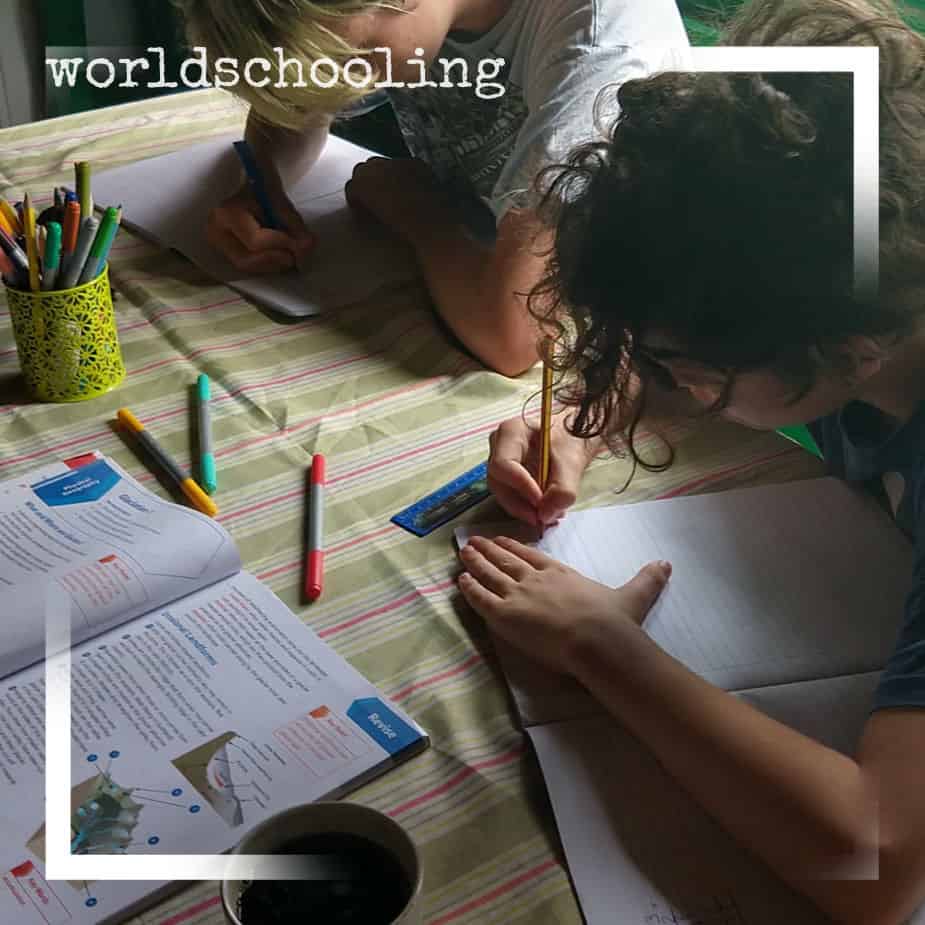
For us, the worldschooling always starts before we reach a destination. We all, together, find out as much about our next country or region as we can before we get on the plane.
Before heading to Scotland and the UK we spent some time watching YouTube videos and finding out about, for instance, Hadrian’s Wall. If the kids didn’t know what that wall was before we got there they’d probably be totally disinterested.
Now most things we see will have some sort of “wow” factor.
After visiting we’ll try and wrap things up and find out more. The destinations always bring up more questions.
I read, I read a lot about our destinations and always have, about their history, culture, beliefs and traditions and I try to take kids to places that will introduce those ideas and spark an interest. I work very hard at worldschooling.
The regular home education is still there too, when I first took responsibility for educating my children I was, like most new homeschooling parents, very school-at-home. I thought that was what you had to do because I had no experience of any other way of learning.
Every day we became more and more unschool as I saw how the learning was actually happening ( this is called de-schooling).
Before we left Australia I was happy to call myself an unschooler for a short period and totally embraced the term and the philosophy. We were, of course, worldschooling in our tropical home in Far North Queensland with the reef and the rainforest as a playground and classroom for all of us.
These days I rarely use the term unschooling at all. In actual fact, I rarely use the term worldschooling. We are just getting an education. Education through adventure.
Over time, elements of school-at-home have crept back in because they needed to.
When we aren’t actively travelling we use workbooks and online learning programs. One item in our educational arsenal was the Minecraft Homeschool courses and the boys got a lot out of those as tweens.
My worldschooling teenager progressed to some Open University courses but teenaged kids become more and more self-directed as time passes by.
Kids’ audio guides, tours and talks slot into life easily on the road and becoming more important as the kids get older.
We always did some written maths and English and sometimes a science work-book as a sort of check list of topics. I also own curriculum books to remind myself and to see if my 10-year-old does actually know what he would be expected to know if he were in school in the UK. This is, after all, a big experiment and I need to monitor the results.
If he didn’t, I would be failing him, everyone needs to know some basics.
He does, he has the same knowledge base as any child leaving a UK junior school should have. He hasn’t been taught it, he’s just picked it up.
I say should, because of course, many normally educated children won’t. Too many slip through the cracks and come out of school functionally illiterate.
These workbooks are needed reassurance for me and a sneaky way to get him writing and spelling, he enjoys science like his mum and writing not so much. He’s cool with it and we make it fun.
Workbooks we use include the series below, all are available online. We’ve tried many, these are our favourites. You’ll often find people suggesting that travelling kids simply keep a journal. Nice idea, but my kids would rather extract their own eyeballs with spoons than journal, so workbooks it is. Try these:
At the same time we’re still worldschooling, homeschooling and sometimes unschooling, we’re learning from Australia, the USA, Asia, London or wherever we happen to be. Learning from museums, zoos, history, diverse people, geography, lifestyles, food and culture.
The kids made new friends and saw how local people live. In London the boys and I went to Forest School for 2 hours per week because it was fun and a good way to experience nature while meeting new people. We’re always learning from the world wherever we are. When we slip into slow travel mode, which is rare for us, a time usually comes when we feel we’re done and need a new environment to learn from
Worldschooling FAQ
Can worldschooled kids sit exams?
Yes, kids who have been worldschooled can indeed sit exams and gain access to higher education. There are many ways to do this. My kids (worldschooled through to 14 and 16-years-old) will be sitting iGCSE. The “i” stands for international. Independent students can also sit regular GCSEs. You will need to find an examination centre, they are all over the world, and show up tosit the exams. A levels can be sat in the same way.
Will worldschooling kids be behind or ahead of their peers?
You can only gauge “ahead” or “behind” in a school environment where all kids are learning the same things, at the same time. In this scenario we have to assume that all kids in the year are considered to be the same age. Which of course, they are not. Kids who are worldschooled generally learn a different set of things. Our experience, when our kids started highschool, was that they were among the most able students in their classes. They slotted into years 9, 10 and 11, with no difficulty whatsoever. No prior school experience was needed. The content that is included in school examinations is very limited. For instance, my son’s History exam covered just three topics, whereas in worldschooling the kids have covered a broad spectrum of world history that most schools never touch on.
Does worldschooling give greater exam success?
This is an impossible question to answer as every child is different. My own findings are that the kids had very strong background knowledge, more-so than their class-mates. They had never sat exams before, nor written an essay. They did just fine. We can never know if they would have done better or worse had they been in school for their entire childhoods. I was very happy with how well they did when they re-entered conventional school.
What’s the best age to start worldschooling?
If we consider worldschooling just in terms of accumulating knowledge, I’d say that the older the child, the more they pick up. Prior to about ten years old my children remember very little from their travels. However, the other benefits of worldschooling, such as being with their families, having freedom to play, the ability to follow their interests and, not being confined to a classroom, do, of course, apply at every age. It’s worth noting that if your child enters the school system and you decide to pull them out later they can find it hard to adjust. Kids get used to being in school.
What are the best destinations for worldschooling?
Try to provide as many diverse locations, cultures and climates as possible. Take your kids to places as most different to their home environment. If your child has a particular interest, for instance in Greek mythology, art, coral reefs, wars, mountains or deserts, take them to those locations. Include activities such as skiing, scuba diving, craft classes, art tours, cooking or any location-specific or just fun activity on offer. If you’re chasing exam passes find out what topic are on the exam paper. Fpr instance, my son studied the Vietnam war for history GCSE. His time in Vietnam was really useful.
How Do Worldschooling Parents Afford to Worldschool?
Some people worldschool for just one year, others, like us, adopt worldschooling for many years. Family gap years are normally funded through savings. Multiple year worldschooling travel requires an income. Digital nomad families, with one or both parents working online, are increasingly common. I fund our worldschooling by being a travel blogger. You can read our posts on how to sell everything and travel, how we saved $30,000, and how travel bloggers make money.
Are There Online Schools for Worldschooling Kids?
Yes and no. Online schools exist and my boys went to one during lockdown. There are also schools of distance education and all manner of tutors available online. We use Outschool. Can you combine online school with travel? You could, but the set timetables would restrict your freedom and your child’s learning. A child following a set curriculum probably won’t have the time to follow their real academic interests nor to read the books they want to read. They certainly won’t be out fully experiencing the destination. I know that we could not have stuck with the online school while travelling full-time. It would have been too difficult to fit around travel. There are many options in education these days, we wholeheartedly recommend a pick-and-mix approach to suit you and your child.
Update: This post was originally written a few years ago, want to skip forward to worldschooling a teenager? It’s all worked out great for my kids. How about homeschooling a 12 year old? Maybe you’d like to know more about the homeschooling resources we use on the road, if so, click through. My kids are teens now and eventually, unexpectedly, went to school. Read why we stopped home or worldschooling here.
It worked. As they get older more and more of their learning comes from their own reading and online explorations. They are happy, they read, they are technologically competent, they know more than me on many subjects, they can do maths, the elder one earns an income. They’re the proof that this works. They continue to be worldschooled but now, as teens, we keep them off the internet. Their lives are their own and we respect their privacy. I’ve never wanted them to go to college or university, but that option is still there should they choose it, as it is for all homeschooled kids.
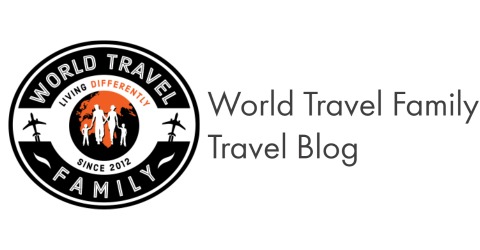
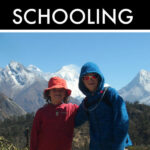
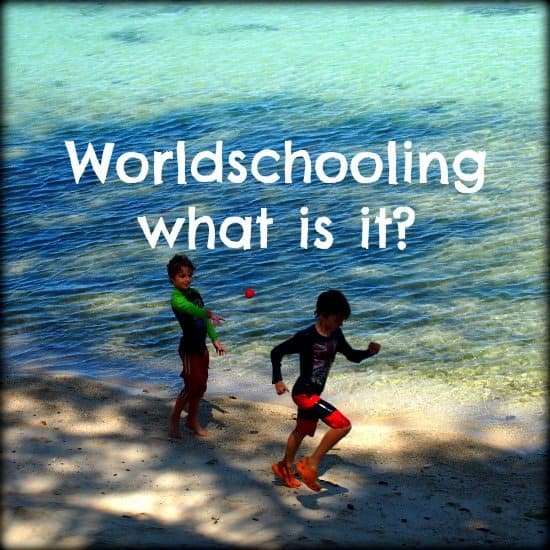
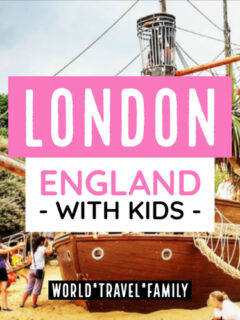

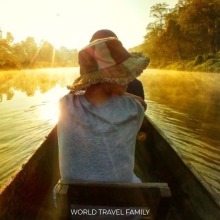
Anisha Sara Babu
Sunday 13th of September 2020
My name is Anisha Sara Babu. I am a mother and a homeschooler to my daughter. I do believe in worldschooling. We are from kerala lndia. Could you please sponsor our family for kerala trips
Bridget
Thursday 20th of August 2020
Hi There I would like to know the workbooks that you went through with your kids? The link wasnt above. We are currently worldschooling and we have stopped in New Zealand during Lockdown and found ourself staying here for a while. We have travelled for 6 months and now just want to pause for a while so would like to use the opportunity to do some basics. But not too much.
Alyson for World Travel Family
Friday 21st of August 2020
Workbooks are one of the homeschooling resources mentioned in the second to last paragraph. Alternatively, try here, also my site. https://homeschoolgrouphug.com/homeschool-workbooks/
Donna GRIFFIN
Friday 10th of July 2020
How did you get started.. did you travel and work before you started to make money from this blog? We are saving for a year off and hoping to find a way to make money while traveling but i would like to start looking for ways to make money before we start travel and maybe help us save money faster... I work from home right now because of covid. But I still have to work an 8 hour day and I could not travel and do this job they will not let us do that yet ...
Alyson for World Travel Family
Saturday 11th of July 2020
Hi Donna, if you buy our e-book it's all in there. But yes, I started this site about 12 months before we left. It didn't start making good money until maybe 3 years in. Blogging is getting harder these days, there are so many huge sites skimming every blogger's content and cherry-picking their ideas that bring the best traffic, then there was Covid. I'm not making enough money today to support us and our traffic is at 10% of normal levels. Things will probably pick up again, eventually. No, you will not be able to work and travel and have fun at the same time. Unless you're me and get up at 3am to work every day. The top travel blogs are all huge businesses now and there's no room for the small sites. I'm struggling. It's just me, I have no team other than my family. One big travel site invested 100 million dollars, they must have thousands of writers, SEO experts, social media managers... it's just hard now. If you want to start a blog to make money I'd go into pets or gardening, or food, something more recession-proof. Or go super niche, start a travel site about your home town for instance. There are almost a thousand posts on this site and each one now takes several days to create. That's a lot of time! But if you pick one location and cover it well and in total detail, you'd get there faster.
Danica
Wednesday 3rd of June 2020
I'm pregnant with our first child and worldschooling is definitely the method we'd like to pursue. I was homeschooled (from the USA) until I was 13 and I always felt like I learned better in that setting than in a traditional classroom. But, unlike my parents, my husband and I love to travel and we can't wait to integrate our adventures abroad into learning opportunities for our kid.
Alyson for World Travel Family
Thursday 4th of June 2020
Wonderful! I hope the world settles back to normal for you just as soon as possible. You'll see in our latest post that my kids are now in school. The current problems forced our hand. It's a shame but it's something different for now. Good luck!
Ryan
Saturday 22nd of February 2020
What a fantastic post! So glad I found your site. I love this idea and can't wait to share this article with my wife to talk about what we might do along these lines in the future!